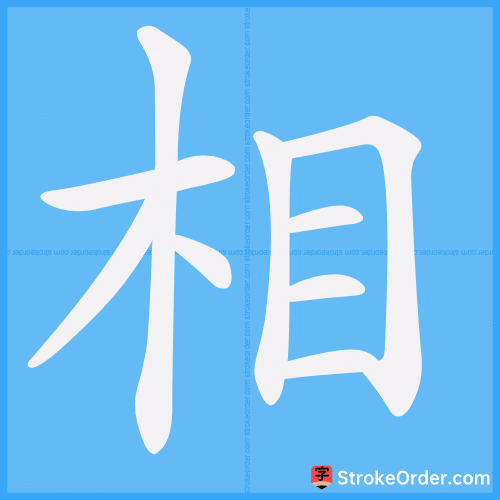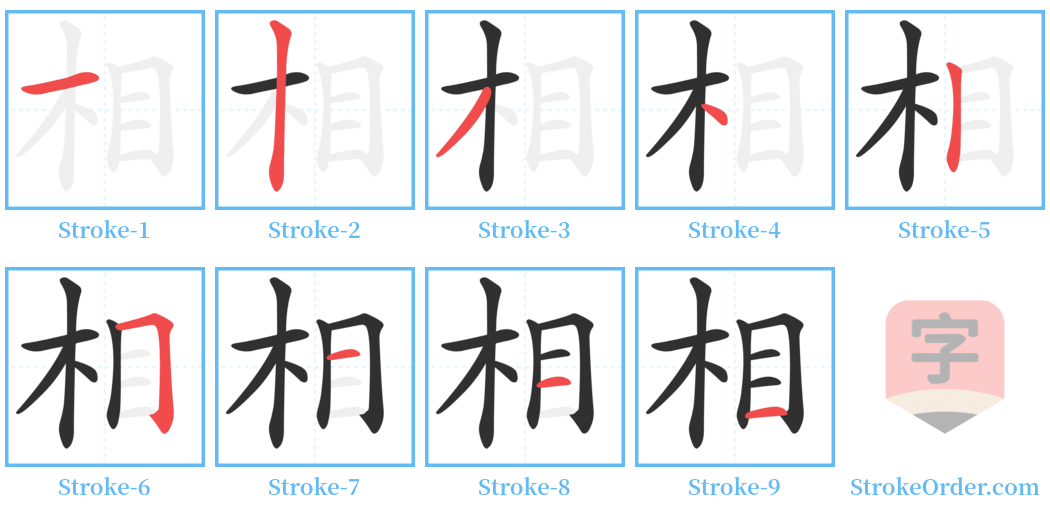相 Stroke Order
Animated Stroke Order of 相

Stroke Order Diagrams for 相

Step-by-Step Handwriting Guide for 相

Learn to Write Chinese Characters with Video Tutorials
Watch the video of writing the Chinese character "相", learn the correct stroke order (笔顺) of the character "相", and master the standard way of writing the character "相".
Free Printable Handwriting Practice with Stroke Order: 相
Printable Writing Practice Worksheet of "相" in Portrait Orientation (Tian Zi Ge)

Printable Writing Practice Worksheet of "相" in Landscape Orientation (Tian Zi Ge)

Information of 相
Pinyin
xiāng、 xiàng
Radical
目
Strokes
9 strokes
Usage
★★★★★
Definition
each other / one another / mutually, appearance / portrait / picture
相 [xiāng]
1. 交互,行为动作由双方来。
Mutual interaction; actions performed by both parties.
2. 动作由一方来而有一定对象的。
Actions taken by one party directed towards a specific object.
3. 亲自看(是否中意)。
To personally check (to see if one is satisfied).
4. 姓。
A surname.
---
相 [xiāng]
1. 交互; 互相
Mutual; each other.
2. 共同
Together; jointly.
3. 递相; 先后
Successively; one after another.
4. 表示一方对另一方有所施为
Indicates how one party behaves towards the other.
5. 表自称
Self-reference.
6. 表对称
Indicates symmetry.
7. 表他称
Indicates third-party reference.
---
相 [xiāng]
1. 相差
To differ.
2. 亲自观看
To see for oneself.
3. 另见 xiàng
See also: xiàng.
---
相 [xiàng]
1. 容貌,样子。
Appearance; looks.
2. 物体的外观。
The appearance of an object.
3. 察看,判断。
To inspect; to judge.
4. 辅助,亦指辅佐的人,古代特指最高的官。
Auxiliary; refers to assistants, specifically high-ranking officials in ancient times.
5. 某些国家的官名,相当于中央政府的部长。
Official titles in certain countries, equivalent to ministers in the central government.
6. 交流电路中的一个组成部分。
A component in an alternating current circuit.
7. 同一物质的某种物理、化学状态。
A certain physical or chemical state of the same substance.
8. 作正弦变化的物理量,在某一时刻(或某一位置)的状态可用一个数值来确定,这种数值称“相位”。亦称“相角”。
A physical quantity that varies sinusoidally; its state at a certain moment (or position) can be determined by a numerical value known as "phase," also called "phase angle."
9. 姓。
A surname.
---
相 [xiàng]
1. 同本义
To look at; examine appearance and judge.
2. 看相
To physiognomize.
3. 辅佐,扶助
To assist.
4. 教导
To teach.
5. 治,治理
To administer.
6. 选择
To choose.
7. 作某国或某人的相; 使作相
To be a minister.
8. 像
To be like.
---
相 [xiàng]
1. 人的外貌,相貌。
Looks; appearance.
2. 照片。
A photo; photograph.
3. 官名。
An official title; prime minister.
4. 古代辅佐帝王的大臣。后专指宰相。
Ancient ministers who assisted emperors; later specifically refers to the prime minister.
5. 汉时诸侯王国的实际执政者,相当于郡太守。
The actual rulers of feudal states during the Han dynasty, equivalent to a governor.
6. 某些国家(如日本)的官名,相当于中央政府的部长。
Official titles in certain countries (e.g., Japan), equivalent to ministers in the central government.
7. 相位。
Phase.
8. 赞礼者,主持礼节仪式的人。
Master of ceremonies; a person who presides over ceremonies.
9. 古代的一种乐器。
Xiang, an ancient musical instrument.
10. 农历七月的别名。
Another name for the seventh month in the lunar calendar.
11. 通过看面容对命运的预卜。
Physiognomy; fortune-telling based on appearance.
12. 古地名。
An ancient place name; Xiang town, located in present-day Anyang, Henan Province.
13. 引盲人行走的人。
A person who guides the blind.
14. 如:相步;相道(向导,引导;观察、选择道路)
Such as: to guide; to observe and choose a path.
15. 另见 xiāng。
See also: xiāng.
to discuss two disparate things together (idiom); to mention on equal terms / to place on a par with / (often with negatives: impossible to mention X in the same breath as Y)
to correspond / answering (one another) / to agree (among the part) / corresponding / relevant / appropriate / (modify) accordingly
to have a whole new level of respect for sb or sth / to sit up and take notice (of sb's improved performance etc)
Input Method for 相
Pinyin
xiang1
Wubi
shg
Cangjie
dbu
Zhengma
flvv
Four Corner
46900
Unicode
U+76f8
Same Pronunciation Characters